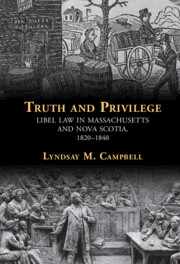
- Publisher:
- Cambridge University Press
- Online publication date:
- December 2021
- Print publication year:
- 2021
- Online ISBN:
- 9781009039406
Last updated 09/07/24: Online ordering is currently unavailable due to technical issues. We apologise for any delays responding to customers while we resolve this. For further updates please visit our website: https://www.cambridge.org/news-and-insights/technical-incident


Truth and Privilege is a comparative study that brings together legal, constitutional and social history to explore the common law's diverging paths in two kindred places committed to freedom of expression but separated by the American Revolution. Comparing Nova Scotia and Massachusetts, Lyndsay Campbell examines the development of libel law, the defences of truth and privilege, and the place of courts as fora for disputes. She contrasts courts' centrality in struggles over expression and the interpretation of individual rights in Massachusetts with concerns about defining protective boundaries for the press and individuals through institutional design in Nova Scotia. Campbell's rich analysis acts as a lens through which to understand the role of law in shaping societal change in the nineteenth century, shedding light on the essential question we still grapple with today: what should law's role be in regulating expression we perceive as harmful?
‘A fascinating comparison of two sister polities with shared legal inheritances, separated by a revolution. Campbell's brilliant study tells a marvellous tale of how Nova Scotia and Massachusetts each struggled to define freedom of expression through law while debates over temperance, religion, science, sexual morality, patriarchy, abolition, and governance swirled around them.'
Constance Backhouse - Professor of Law, University of Ottawa
‘In a fascinating comparative account of diverging constitutional systems, Professor Campbell deftly disentangles the unfamiliar roots of modern debates about free expression, ‘truth,' and the public order.'
Mary Sarah Bilder - Founders Professor, Boston College Law School
‘Based on extensive research in case law, Lyndsay Campbell provides fascinating insights into the ways in which the evolving law of libel in Nova Scotia and Massachusetts reflected significant differences between societies that were similar in many respects. Her title points to a major contrast. The emphasis on the defense of truth in Massachusetts derived from commitments to individualism, whereas the focus on claims of privilege in Nova Scotia highlighted the role of institutions in protecting speech.'
David M. Rabban - University of Texas School of Law
‘This is a rich and wide-ranging comparative study of the law of libel and defamation at a formative time in American and Canadian legal history, but much more besides. Campbell bridges borders - Canada and the USA but also between criminal and civil libel, elites and more ordinary people - to offer a fascinating look at how legal debates over expression shaped vital broader issues like constitutional ordering, abolitionism, religious dissent, obscenity, and privacy.'
Eric H. Reiter - Concordia University, Montreal
‘This book will be of interest to any historian seeking to better understand free speech, law, society and power in Nova Scotia and Massachusetts in the early nineteenth century.’
Kristin A. Olbertson Source: Comparative Legal History
 Loading metrics...
Loading metrics...
* Views captured on Cambridge Core between #date#. This data will be updated every 24 hours.
Usage data cannot currently be displayed.